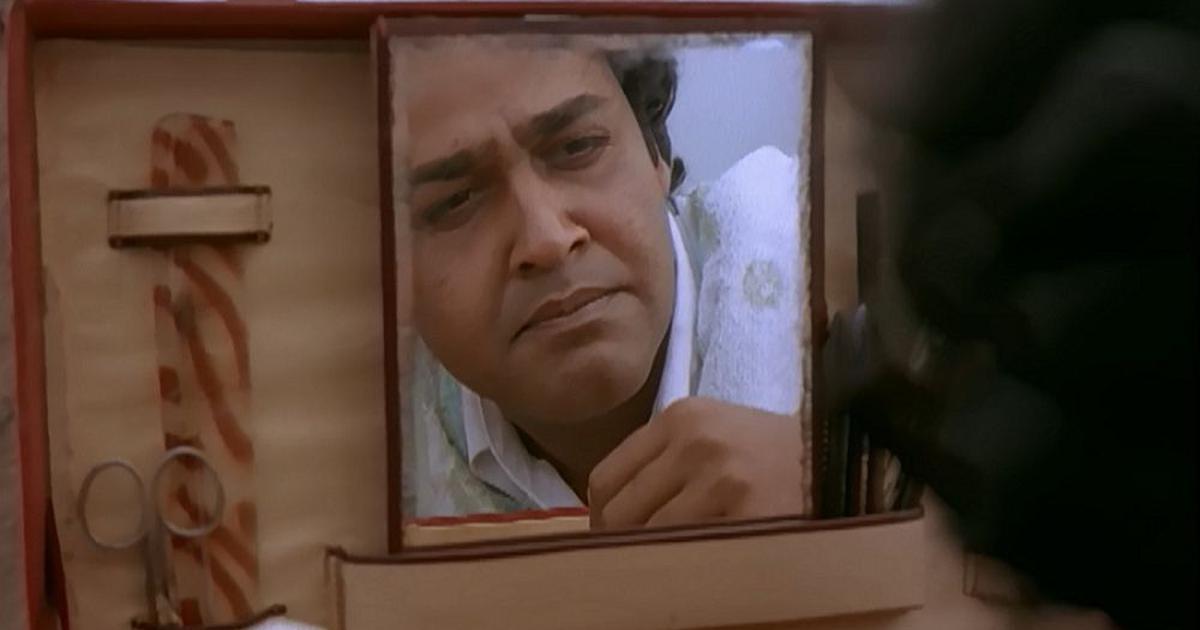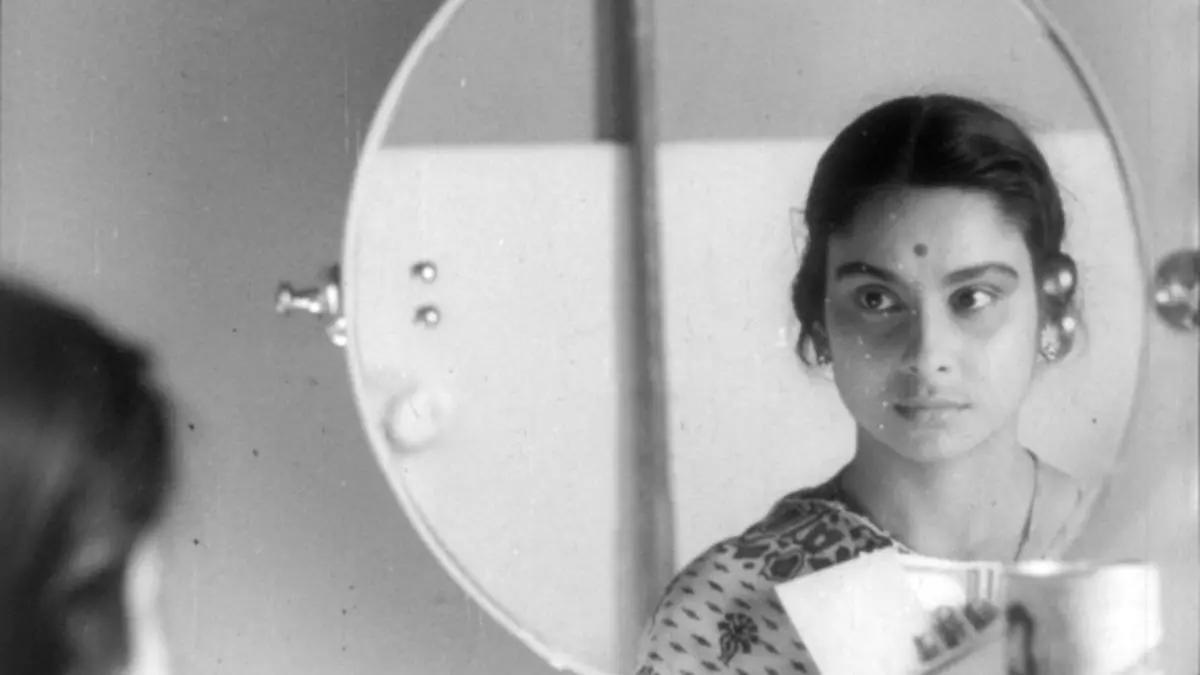First White Hair: A Translation of Harishankar Parsai’s Pehla Safed Baal

A still from Iruvar, directed by Mani Ratnam (Madras Talkies, 1997, 158 minutes).
Today, the first white hair revealed itself. Peeping from amidst the black hair near the ear, the sudden appearance of this thin silver wire messed up with my head.
It felt as if while one is enjoying the forest in spring a lion suddenly appears from the bushes, or how a carefree soldier spots the crown of an enemy soldier scaling the wall of the fort assumed to be in strong stead at night, or how a lover lost in embrace of his beloved in a park suddenly spots the father of his beloved.
The pain of getting pricked while walking on a carpet is immense. I had been walking on a carpet until now. Taking after Narcissus, I would observe my conceited self in the mirror, blooming with happiness at the sight of my curly black hair as I caressed and arranged them. I would elbow aside age, thumb my nose at senescence. But today, that white hair near my ear ended up whispering to me, “Mere bhai, let me tell you something in confidence – begin wrapping up your establishment now.”
I am sad since then. Intellectuals will reason – that which is inevitable, why must it cause agony? Oh yes, death is inevitable, too. So then, must one frame their entire life within the pyres of a crematorium? And has any intellectual ever overcome all the worldly sorrows? Was he any less erudite when he took the dying Lakshmana’s head in his lap and lamented that all his energy has been spent? And he, the one who had imparted to Arjun the wisdom of maintaining equilibrium, did not his eyes fill up with sorrow when he heard the sad tale of Gokul from Udhav? Those who consider Death as a festival are the ones who are most terrified by the idea of Death. They supress the veracity of this fear within their heart by making a great hullabaloo of the festival.
In truth, I am unhappy. A white shroud is being weaved on my head; today the first thread has been laid. Age will continue weaving it and it will engulf the corpse of youth. Won’t I feel sad? Only those who were born old won’t feel sad.
I am incensed at the mirror. In theory, it is very indulgent – it eases the contortions and makes the face appear graceful than it is. It unexpectedly became cruel today. Could it not hide this singular strand? Would not revealing it have compromised and blotched its reputation? Urdu poets have referenced such delicate mirrors that reflect their own image in the face of their lovers, that lose their senses as soon as they appear in front of that face, that shatter because they are unable to fully reflect their beauty. To confront beauty is no game. Moses had passed out. Urdu poets have such virtuous mirrors, and this is the mirror of a Hindi writer.
But how is the mirror at fault? It is my hair that has turned white. I donned them on the head, nurtured them through bodily fluids, emptied thousands of bottles of oil – and yet they deceived me. Perhaps this is why a hermit gets rid of them, for the spirt of that recluse too wavers in front of them.
Today, my self-confidence has gone astray, my courage is wavering. Today, the fort has given way to the first tunnel. It won’t be long before the enemy makes its appearance.
What must I do? Uproot it? But I have heard that uprooting one white hair would cause a bunch to go white there. I wish I was blessed like Ravana, damnit. My chacha had a separate servant to only pluck his white hair. But soon his head gave way to a flourish of kans grass. A particular oil has become very dear to me. It is believed that its application turns hair black (not mentioning the name lest it gets publicised needlessly), should I apply that oil? But that won’t eliminate the enemy, it will only change its uniform. Some people apply rinse. They are exceedingly pitiable. Subdued by old age, they put up a false show of youth. One of my acquaintances used to apply rinse. He looked old on Saturdays, and young on Mondays – Sundays were his dyeing days. I wonder whom did he show his black hair to in his declining age? Perhaps his wife from the third marriage. But she must have seen him dyeing his hair. And, is it possible to evoke the illusion of youth by merely showing black hair to a woman? No, this is not done. One must allow the enemy to plant itself on the head. I know that slowly and steadily it will turn all the faithful hair to defect.
I am reminded of my fellow brother, poet Keshavdas who, on being addressed as “baba” by moon-faced and gazelle-eyed girls showered his wrath on his hair. O my forefather, crestfallen, passionate poet, I can now very well understand the paroxysm of your mind. I am coming, following after you. Not “baba”, but she has started calling me “dada” – there is just a slight distance.
My mind is at great unease. Narcissus had to endure the consequences of his excessive vanity; I too would have to bear it. I am petrified of another reason. I have noticed that as soon as a white hair appears, man begins to calculate all that he has gained till now, what needs to be done and what has been accumulated for the future. Calculation does good to no one. It causes competition to transpire, and man begins to prostrate in directions from which he gains something. Many great heroes bite the dust. Many great idols get desecrated. These eyes have witnessed the crumbling of many a glorified idols in the field of politics, literature, and social service; they have witnessed the breach of many a faith. This is a very vulnerable age; a lot many bargains happen in the season of white hair. The flag of treaty has begun to fluttering on the head. It is proclaiming, “enemies of mine, I have laid down my arms. Come, let us make a pact.” So now, should there be a pact with whom one has struggled against? An accord with those whom I assumed to be wrong?
But why have such pivotal questions cropped up in front of me today? The roots of hair do not run deep. They do not spring from the heart. They are superficial, flippant! Youth is not solely the name of black hair. Youth is the name of the willingness to acquire new feelings, new thoughts; youth is the name of courage, enthusiasm, perseverance and a life filled with peril; youth is the name of the desire to escape from the clutches of the rut. And most of all, youth is the name of being unflinchingly reckless. I incessantly keep doing stupid things. This white flag is a deception. There is no hurry to calculate. How does a white hair even matter?
I am not saying this to someone else, instead I am explaining this to myself. This is a Janus-faced struggle – baffling others while placating our mind. Others do not pose threat. What ruin can befall others because of white hair? This mind, however, is my own. It would require persuasion, “bhai, you don’t fret. Why, what has happened till now? This is just the first one. And then, if you don’t weaken, nothing will go wrong.”
The discovery of the first white hair is an event. When Dashrath spotted white hair near his ear, he resolved to hand over the throne to Rama. He had four sons. It was only fitting that he handed over the throne. To whom must I deliver? There is no one before me to shoulder the responsibility of my colossal burden. Which son must I entrust the responsibility to? One of my friends has three sons. In the morning, this Dashrath of mine feeds his prince-like sons to milk mixed with water through cupped palms. They don’t have shoulders – where would they place the burden? Great men have two kinds of sons – those who exist in reality but are not addressed so, and those who are addressed so but are not so. Those who are addressed so become inheritors of wealth and property while those who are sons in truth either pull away at fans or wash away utensils. To be affirmed is much more beneficial than to be.
I do not have any sons. Had I had one, I would have been in trouble. What would I have given them? The days of aristocracy are over, the days of assets and stocks are here. But I don’t have anything in hand which can be given away. Neither do I have a successor nor his successor. Will this event pass without giving?
But what must we give? We grew up in the shadows of the Great War, we grew up in poverty and nothingness, we survived by thriving solely on strong will. The hair of my generation has been white since birth. What do we have? Yes, the future but even that is not ours to claim – it belongs to those who are yet to come. So, I am not that much of a pauper – there is an enormous future. And now, the crisis of successors has been resolved as well. Sons are of generations. One cannot claim to be a father by the mere virtue of being the birth-giver. How can one son lay claim to the enormous future? How does it matter who is whose son, who is the father? To all the sons of my generation, I give you that future. Although it has not yet materialised, we are striving to realise it. We are rutting in the foundation so that we may fashion a grand future for you. It will show up as a present – we did not even have a present. I give you the future and giving it implies that we are giving away ourselves for we are snuffing out in the act of creating it. Let our hair go white. We are occupied with work – we know that the moment of terminating the work is the same as the moment of dying.
We don’t want anything from you. We are not as selfish as Yayati who assumed a youthful appearance by exchanging it with his son. Not only did he blacken his hair but also his face.
We don’t want anything from you. We are sinking in the foundation for you – here, we hand over the urn to you.

A still from Mahanagar, directed by Satyajit Ray (RD Banshal & Co, 1963, 131 minutes).
Sonakshi Srivastava is a writing tutor at Ashoka University, Sonepat, India.
She is one of the recipients of South Asia Speaks mentorship programme (cohort 2021), working on translating the Hindi novel, “Titli” into English under the mentorship of Arunava Sinha. She was the contributing translator columnist at “The Bilingual Window’. She was longlisted for The Stinging Fly Translation Bursary 2022, and was awarded the Katharine Bakeless Nason scholarship for the Bread Loaf Translators’ Conference 2023. She is also the incoming translation editor at Usawa. Her works have previously appeared in or are appearing in Usawa, Proseterity, The Monograph, Alipore Post, Hakara, potluck zine, orangepeel mag, Qissa mag, and Rhodora among others.




